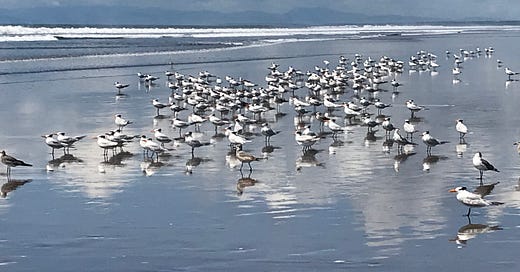As the new year unfolds, I find myself on the fence. This is an uncomfortable place to sit if you’re not a bird. The pickets are sharp and pointy and the fence is high off the ground. The view from up here is dizzying. Some days, I wobble and come dangerously close to falling onto the dark side where fire sweeps into the Denver suburbs and the ICUs are once again overwhelmed. So far, like the tightrope walker at the Barnum and Bailey big tent of my childhood, I’ve been able to right myself and regain my balance. I consider the verse from Psalm 30, weeping may endure for a night, but joy cometh in the morning. This is wise guidance and true to reality as I know it. After the crying comes the cake. Still, I’m finding myself troubled by that word, joy. It’s possible that I don’t know what it means. I remember being at Elat Chayyim, the Jewish Renewal retreat center then in New York state, where on shabbes there would be two services. There was the quiet, contemplative Saturday morning Torah service. But first came the Friday night celebratory worship with its singing and dancing, its great fervor. I was all alone during the singing and dancing, on the outside looking in. I didn’t feel it. I wanted to feel it, but I’m not an exuberant Jew. Nor am I a boisterous Buddhist, though I certainly experience moments of amazement and delight. Overall, my relationship to spirit is reflective, solitary. Noticing is my preferred posture.
Recently, I’ve been noticing an increasing pressure to be joyful. Choose joy, people say. Make space for joy. This demand grows in direct proportion to an uptick in Omicron cases, a rise in the rate of violent crime, the assault on voting rights, as if we’re all in danger of being washed away in a tsunami of despair if we don’t reinforce the floodgates that defend our capacity for joy. It’s one of two mechanisms of defiance I’m currently experiencing coming from two opposite directions, leaving me feeling like a spent tube of toothpaste, squeezing me out. On the left, there is this orthodoxy of joy that wants to legislate agains the range of feelings we experience in our long travail, not allowing for anger, for burn-out, indeed for fear. On the right, we have the intransigence of unvaccinated libertarian family members who carry on as if there is no pandemic. Between the two, I cautiously proceed, keeping my eyes open, on the lookout for pockets of reason, slivers of sunshine. The middle is always a tough place to find yourself, even though it’s likely where most people live.
This is especially true in the new New England winter. There has been very little cleansing snow, many days above freezing but not much sun to speak of. The landscape reflects my mood which is tired. Tired of the stranglehold the virus has had on us. Tired of the vicious, exploitive political landscape, and the extreme polarization of the culture which leans into absolutes. Don’t ask me to apprehend the world in one continuous pattern of black and white. Don’t expect me to wake up in joy and retire in joy. Understand that whatever it is, I can only receive it in small bites, now and now and now and now, sometimes lilac and sometimes peach, and often gray. Like literature, of which George Saunders writes on his Substack Story Club, “the highest aspiration of fiction [is] to mean in a way that is real but eludes reduction.” Reduction is the opposite of deep experience, the enemy of knowing.
I’m partial to the idea of ease. Ease is modest. It’s elusive, but when it comes, I feel it feathering down my body. It is now and now and now and now, one moment at a time, one moment when I’m alert to being alive and not under siege by thoughts that militate against my wellbeing, not worrying about what happens next. Is this what people mean when they talk about joy? Who can say? There’s no shared understanding of what that might mean. It’s like color. Frank and I have been arguing, affectionately, for forty-five years about what’s blue and what’s green. I’ll say, “look at that turquoise lamp. What a lovely shade of blue.” And he’ll say, “you mean the green lamp on the desk?” Words are just signifiers. Joy is in the belly of the beholder.
Copies of my 2019 essay collection, Twilight Time: Aging in Amazement, are available directly from me (signed) or from Amazon or your local bookseller





Susie, you put your finger on precisely where I am right now.
I meant to read this and comment... and suddenly it's June! I've been wondering about joy and happiness. What is it? Why do I not feel it as often as I think I should? Yes, I've had joyful "moments" but it's not a state I live in. If I were at that renewal service, I would have been alone, next to you. Someone once told me that "a mother is only as happy as her least miserable child." and there is some truth in that. Or is it only true for Jewish mothers? Thank you for expressing what has been on my mind. I guess I'll hang out with you on the fence, in the NOW, and leave joy to find me.